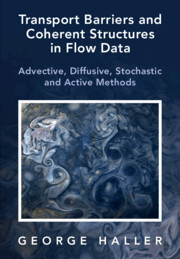 Transport Barriers and Coherent Structures in Flow Data
Transport Barriers and Coherent Structures in Flow Data Published online by Cambridge University Press: 20 February 2023
In this chapter, we will discuss barriers to purely advective transport in velocity fields that may have complex spatial features but a simple (recurrent) temporal structure: steady, periodic or quasiperiodic. Such velocity fields can be integrated for all times on bounded domains and hence their trajectories can be interrogated over infinite time intervals. While such exact recurrence is atypical in nature, mixing processes with precisely repeating stirring protocols are abundant in technological applications. Here, we survey classic results on temporally recurrentvelocity fields partly for motivation, partly for historical completeness and partly because their predictions in distinguished (recurrent) frames coincide with the predictions of Lagrangian coherent structure (LCS) methods to be discussed in the next chapter. For this reason, recurrent velocity fields are ideal benchmarks for LCS techniques because their transport barriers can be unambiguously identified. There are also a number of technological mixing processes in which the velocity field is engineered to be spatially recurrent, and hence the techniques discussed here apply directly to them.
To save this book to your Kindle, first ensure no-reply@cambridge.org is added to your Approved Personal Document E-mail List under your Personal Document Settings on the Manage Your Content and Devices page of your Amazon account. Then enter the ‘name’ part of your Kindle email address below. Find out more about saving to your Kindle.
Note you can select to save to either the @free.kindle.com or @kindle.com variations. ‘@free.kindle.com’ emails are free but can only be saved to your device when it is connected to wi-fi. ‘@kindle.com’ emails can be delivered even when you are not connected to wi-fi, but note that service fees apply.
Find out more about the Kindle Personal Document Service.
To save content items to your account, please confirm that you agree to abide by our usage policies. If this is the first time you use this feature, you will be asked to authorise Cambridge Core to connect with your account. Find out more about saving content to Dropbox.
To save content items to your account, please confirm that you agree to abide by our usage policies. If this is the first time you use this feature, you will be asked to authorise Cambridge Core to connect with your account. Find out more about saving content to Google Drive.